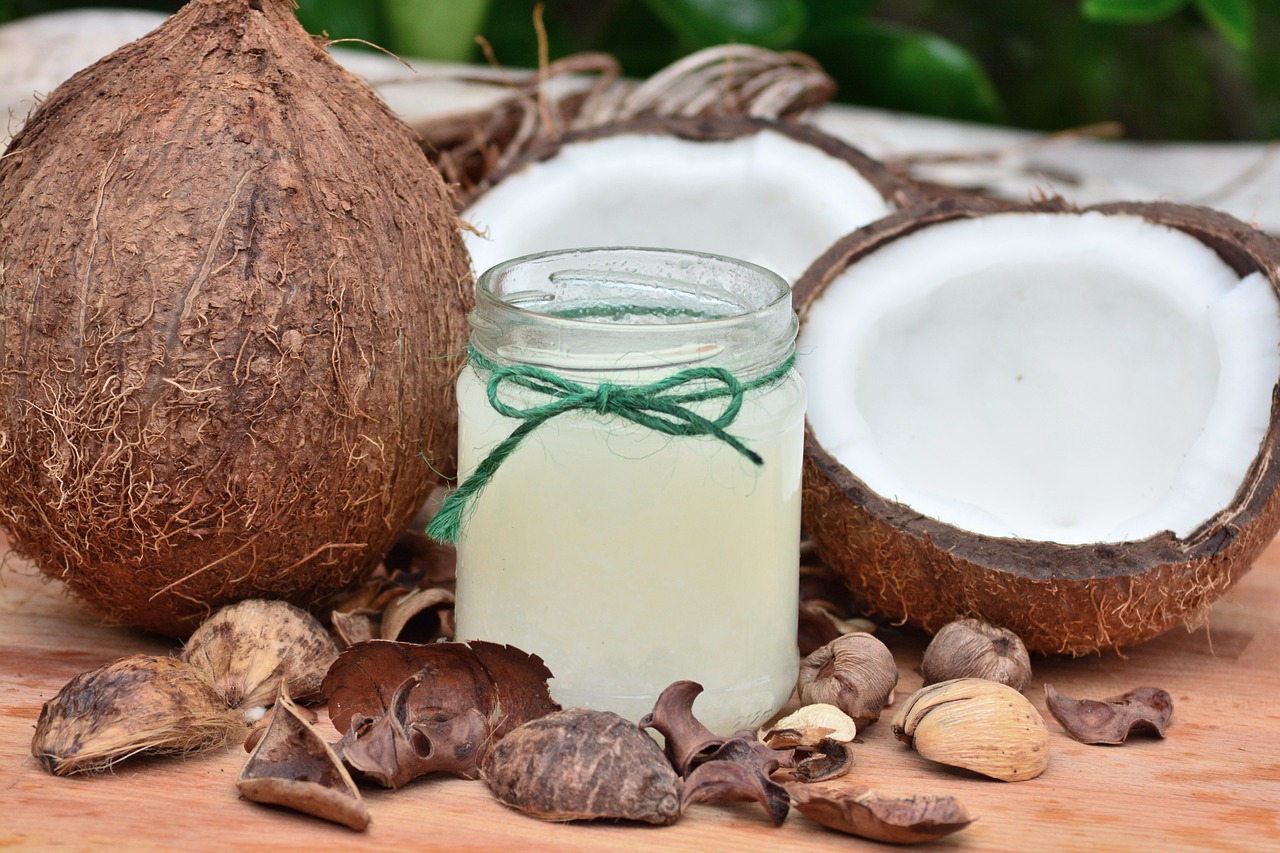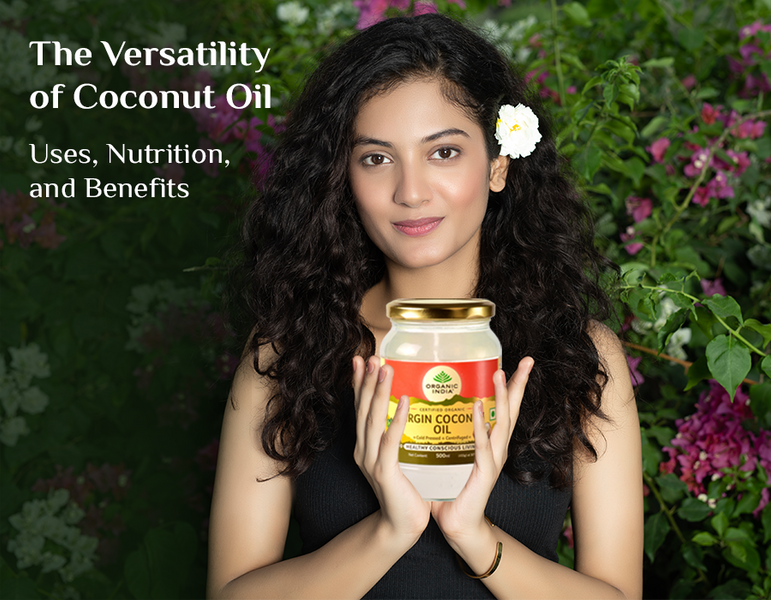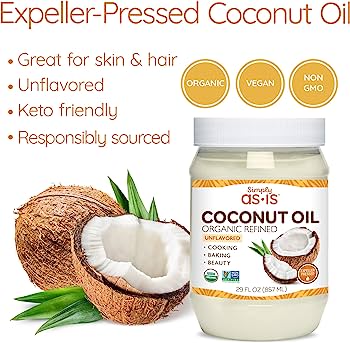Table of Contents
Coconut oil, once considered a humble cooking ingredient in tropical regions, has transformed into a global wellness trend. Its journey from a culinary staple to a versatile health and beauty product has captivated the attention of health enthusiasts, nutritionists, and beauty aficionados alike. In this article, we delve into the multifaceted world of coconut oil, exploring its historical significance, culinary uses, and its remarkable rise as a wellness trend.
Coconut oil’s remarkable evolution from a basic culinary ingredient to a global wellness phenomenon is a testament to its enduring versatility and the ever-expanding quest for holistic well-being. Let’s further explore the multifaceted journey of coconut oil and its transition from kitchen staple to an essential component of wellness routines worldwide:
Cultural Heritage: The roots of coconut oil’s popularity trace back to the cultures that first embraced it. Its rich flavor and nutritional value have been cherished for generations in tropical regions. As global travel and communication have brought these traditions to the forefront, coconut oil’s reputation has grown beyond its place of origin.
Nutritional Rediscovery: The resurgence of interest in coconut oil is closely tied to a growing awareness of its unique nutritional composition. As people seek alternatives to highly processed cooking oils, the spotlight has turned back to this natural option. Medium-chain triglycerides (MCTs) in coconut oil are celebrated for their potential to boost energy, support brain health, and aid in weight management.
Holistic Health: Coconut oil’s journey into the realm of wellness extends beyond just culinary curiosity. Its use in holistic health practices aligns with a broader movement toward natural and traditional remedies. This shift reflects a desire for more mindful, nature-based approaches to health and well-being.
Natural Beauty: The beauty industry’s fascination with coconut oil is rooted in its purity and effectiveness as a natural skincare and haircare ingredient. As consumers seek cleaner and more sustainable beauty options, coconut oil’s reputation as a versatile and eco-friendly choice has grown.
Wellness Integration: Coconut oil’s versatility allows it to seamlessly integrate into various wellness routines. Whether used as a cooking oil, a natural teeth-whitening agent, a hair mask, or even a component of holistic dietary plans like keto or paleo diets, it adapts to meet diverse wellness needs.
Scientific Exploration: Ongoing scientific research into coconut oil’s potential health benefits fuels its popularity. While many of its claimed advantages are anecdotal, studies continue to shed light on the mechanisms behind its impact on metabolism, skin health, and more.
Consumer Empowerment: In the age of information, consumers have become more discerning about the products they use and the foods they eat. As coconut oil’s benefits and applications are widely discussed and shared on social media and wellness blogs, individuals are empowered to make informed choices about incorporating it into their daily lives.
In conclusion, coconut oil’s journey from a regional culinary staple to a global wellness trend is a testament to its adaptability and the evolving preferences of consumers seeking holistic well-being. Its continued popularity serves as a reminder of the rich tapestry of traditions, knowledge, and natural resources that contribute to our ever-expanding understanding of health and beauty. Whether enjoyed in a traditional recipe or as part of a contemporary wellness ritual, coconut oil remains a symbol of nature’s timeless treasures.
Explore this link for a more extensive examination of the topic: The Versatility of Coconut Oil: Uses, Nutrition, and Benefits …
A Rich History
Coconut oil’s history dates back thousands of years, with its roots deeply embedded in the tropical regions where coconut palms flourish. In these regions, coconut oil has served as a dietary staple, prized for its flavor and versatility in cooking.
Coconut oil’s rich history spans millennia, tracing its origins to the lush and vibrant tropical regions where coconut palms have thrived for generations. Embedded in the culture and cuisine of these locales, coconut oil has played a multifaceted role, serving as a dietary cornerstone renowned for both its distinctive flavor and remarkable versatility in the culinary world.
For countless generations, the coconut palm has been revered as the “Tree of Life” in these tropical regions, providing not only sustenance but also materials for shelter, clothing, and a myriad of other purposes. Coconut oil, extracted from the fruit’s meat, has been a central component of the indigenous diet, lending its unique taste to a wide array of dishes. Its subtle nutty aroma and rich, slightly sweet flavor have made it a cherished ingredient, enhancing the taste of everything from savory curries to sweet desserts.
Beyond its culinary allure, coconut oil has been celebrated for its versatility in cooking. Its high smoke point makes it an ideal choice for frying, sautéing, and baking, imparting a delightful crispness and depth of flavor to a variety of dishes. Its natural solidity at room temperature has also made it a prized ingredient in pastry making, where it lends a flaky texture and a hint of coconut essence to pies and pastries.
In addition to its gastronomic significance, coconut oil has found its place in traditional medicine and skincare routines in these tropical regions. Renowned for its moisturizing properties, it has been used as a natural emollient, nourishing the skin and hair. Its antimicrobial properties have also made it a valuable resource for healing and protecting against various ailments.
In the modern world, coconut oil has transcended its tropical origins and gained international acclaim for its potential health benefits. It is celebrated for its potential to boost metabolism, promote heart health, and support weight management. However, it’s important to note that while it has many advantages, it should be consumed in moderation due to its high saturated fat content.
As we continue to explore the diverse culinary and health-related applications of coconut oil, we honor its deep-rooted history in tropical regions. This humble substance, extracted from the bountiful coconut palm, serves as a reminder of the enduring connection between culture, nature, and the culinary arts. Whether used as a fragrant addition to a savory dish or a nourishing component of skincare rituals, coconut oil’s journey from tropical tradition to global treasure is a testament to the enduring power of natural resources in shaping our lives and enriching our experiences.
Looking for more insights? You’ll find them right here in our extended coverage: The sudden collapse of coconut oil, 2015’s favorite superfood – The …

Culinary Traditions
Across Asia, the Pacific Islands, and parts of Africa, coconut oil has been integral to the preparation of traditional dishes. Its high smoke point and rich flavor make it ideal for frying, sautéing, and as an ingredient in curries and sauces.
nullLooking for more insights? You’ll find them right here in our extended coverage: Why Rose Products Are Everywhere in the Wellness World Right …

Nutritional Benefits
Coconut oil contains a unique composition of fatty acids, including medium-chain triglycerides (MCTs), which are believed to offer various health benefits. MCTs are readily absorbed and used for energy, making coconut oil a source of quick and sustained vitality.
Coconut oil, renowned for its distinctive composition of fatty acids, particularly medium-chain triglycerides (MCTs), has garnered increasing attention for its potential health advantages. MCTs are a class of fatty acids with shorter carbon chains compared to long-chain fatty acids found in many other oils and fats. This unique characteristic confers several noteworthy benefits to coconut oil.
One of the standout features of MCTs is their remarkable bioavailability. When consumed, MCTs are rapidly absorbed by the body and transported directly to the liver. This efficient metabolic pathway means that MCTs are quickly converted into energy, making coconut oil an excellent choice for those seeking a readily available and sustained source of vitality. This energy boost can be particularly beneficial for athletes, individuals following low-carb or ketogenic diets, and those looking to enhance their cognitive performance.
Moreover, MCTs have been associated with improved satiety and weight management. Unlike long-chain fatty acids, which are more prone to storage as body fat, MCTs are efficiently utilized for energy production. This can contribute to a feeling of fullness and potentially aid in reducing overall calorie consumption, which is a valuable factor in maintaining a healthy weight.
Furthermore, some studies suggest that MCTs may have a positive impact on cognitive function. The brain thrives on a constant supply of energy, and MCTs’ ability to provide a readily available energy source might support mental clarity and focus, potentially benefiting individuals facing cognitive challenges or those looking to enhance their brain function.
It’s important to note that while coconut oil offers these potential health advantages, it should be consumed in moderation as part of a balanced diet. Like all fats, it is calorie-dense, and excessive consumption can lead to weight gain if not accounted for in daily calorie intake. Also, not all MCTs are the same; coconut oil primarily contains two types, C8 and C10, which are considered the most beneficial for health. For more precise health benefits, consider incorporating pure MCT oil, which contains higher concentrations of these specific MCTs, into your diet.
In conclusion, coconut oil’s rich MCT content makes it a unique and versatile dietary addition. Its ability to provide quick and sustained energy, support weight management, and potentially enhance cognitive function underscores its value as a functional food. When used judiciously as part of a well-rounded diet, coconut oil can contribute to a healthier and more energetic lifestyle.
Should you desire more in-depth information, it’s available for your perusal on this page: 5 Reasons Coconut Oil Is A Household Staple – Lily of the Desert

Cultural Significance
In many cultures, the coconut tree is regarded as the “tree of life.” Coconut oil plays a role in cultural rituals, ceremonies, and even traditional medicine.
The coconut tree’s revered status as the “tree of life” transcends geographical boundaries, deeply ingrained in the cultures of tropical regions. Its significance extends far beyond providing sustenance; it symbolizes resilience, abundance, and a profound connection to nature.
In numerous cultures, the coconut tree has earned its esteemed title due to its unparalleled versatility. Not only does it yield nourishing fruit, but its every part finds purpose in daily life. From the nourishing coconut water, often referred to as “nature’s electrolyte,” to the fibrous husk used for making ropes and woven crafts, every component is put to use.
Coconut oil, in particular, occupies a central place in these cultures. Beyond its culinary use, it features prominently in various aspects of daily life. In some regions, it’s utilized in cultural rituals and ceremonies, signifying purity, blessings, and prosperity. Its aromatic presence is believed to ward off negative energies and invite positive vibes, making it an integral part of religious practices.
Moreover, coconut oil boasts a rich history in traditional medicine. Its natural healing properties are harnessed for skincare, haircare, and even as an effective remedy for a range of ailments. It is celebrated for its moisturizing qualities, its ability to soothe skin irritations, and its potential to promote overall well-being.
As the world embraces holistic wellness and natural remedies, coconut oil’s role in traditional medicine gains renewed recognition. Its chemical composition is studied for potential health benefits, further highlighting the wisdom of these cultures that have valued it for centuries.
In essence, the coconut tree’s status as the “tree of life” transcends mere symbolism. It represents the harmonious relationship between humans and the natural world, offering not just sustenance, but a profound cultural and medicinal legacy that continues to enrich the lives of those who revere it. It serves as a reminder of the wisdom and resourcefulness of cultures deeply connected to the earth.
Don’t stop here; you can continue your exploration by following this link for more details: Coconut Oil | The Nutrition Source | Harvard T.H. Chan School of …

Wellness in a Jar
In recent years, coconut oil has transcended its culinary origins and found a place on bathroom shelves, in natural beauty products, and as a wellness elixir.
In recent years, coconut oil has undergone a remarkable transformation, transcending its traditional role in culinary applications to become a versatile and sought-after ingredient with a presence not only in the kitchen but also on bathroom shelves, in natural beauty products, and even as a wellness elixir.
Traditionally, coconut oil was celebrated for its unique flavor and high smoke point in cooking, making it a staple in various cuisines worldwide. However, its value extends far beyond the culinary realm. It has found a new and expanded role in personal care and wellness routines, thanks to its numerous beneficial properties.
In the realm of beauty and skincare, coconut oil has emerged as a natural wonder. Its inherent moisturizing abilities, along with its antibacterial and antifungal properties, make it a popular choice for skincare products. From moisturizers and cleansers to hair masks and lip balms, coconut oil has become a key ingredient in many natural beauty formulations, promising to nourish, hydrate, and revitalize the skin and hair.
Moreover, coconut oil has earned a reputation as a wellness elixir. It’s been adopted as a health-conscious alternative for cooking oils and a staple in plant-based diets. Its medium-chain triglycerides (MCTs) are believed to offer a variety of potential health benefits, from supporting weight management to providing a quick source of energy. Additionally, coconut oil has found its place in practices like oil pulling and aromatherapy, where its pleasant aroma and potential therapeutic properties are harnessed for holistic well-being.
This transformation of coconut oil from kitchen essential to multi-purpose ingredient reflects our evolving understanding of its diverse uses and potential benefits. It illustrates how a natural, time-tested product can adapt to meet the needs and desires of modern consumers seeking both practicality and wellness in their daily lives. As coconut oil continues to innovate and diversify, its journey from the pantry to the bathroom and wellness routines is a testament to the enduring appeal of nature’s treasures in our ever-evolving world.
For additional details, consider exploring the related content available here Refined vs. Unrefined Coconut Oil: Here’s the Real Difference …

Skincare and Haircare
Coconut oil is lauded for its moisturizing and soothing properties. It is used in a range of skincare products, from lotions to lip balms, and is applied directly to the skin and hair as a natural remedy for dryness and damage.
nullTo expand your knowledge on this subject, make sure to read on at this location: The Versatility of Coconut Oil: Uses, Nutrition, and Benefits …

Oil Pulling
An ancient Ayurvedic practice called “oil pulling” involves swishing coconut oil in the mouth to improve oral health. Advocates claim it can reduce bacteria, freshen breath, and promote healthier gums.
An ancient Ayurvedic practice called “oil pulling” has gained significant attention in recent years for its potential benefits in improving oral health. This age-old tradition involves swishing coconut oil (or other edible oils like sesame or sunflower oil) in the mouth for a specified period, typically around 15-20 minutes. Advocates of oil pulling assert that this practice can offer a range of advantages that extend beyond just oral hygiene.
One of the primary claims made by proponents of oil pulling is that it can reduce harmful bacteria in the mouth. The swishing action is believed to help remove bacteria, debris, and toxins from the oral cavity. While scientific research on this specific aspect of oil pulling is ongoing, some studies have shown a reduction in the levels of certain bacteria known to contribute to dental issues.
Additionally, oil pulling enthusiasts often report fresher breath as a noticeable benefit. The cleansing action of swishing oil may help combat bad breath by reducing the population of odor-causing bacteria. This natural and chemical-free approach to improving breath quality has attracted those seeking alternatives to conventional mouthwash.
Another key aspect of oil pulling’s potential benefits is its impact on gum health. By reducing bacteria and inflammation in the mouth, oil pulling may contribute to healthier gums. Healthy gums are essential for overall oral well-being, as they play a crucial role in supporting teeth and maintaining their stability.
While oil pulling has garnered a dedicated following and anecdotal evidence suggests positive results, it’s important to note that scientific consensus on its effectiveness is still evolving. Research in this area is ongoing, and more clinical studies are needed to establish a clear link between oil pulling and specific oral health benefits.
It’s also essential to remember that oil pulling should not replace established oral hygiene practices such as regular brushing, flossing, and dental check-ups. Instead, it can be viewed as a complementary practice that may offer additional benefits when incorporated into a comprehensive oral care routine.
In conclusion, the ancient Ayurvedic practice of oil pulling, particularly when using coconut oil, has gained popularity for its potential to enhance oral health. While some of its benefits are supported by anecdotal evidence and limited research, it is essential to approach oil pulling as part of a broader oral care regimen and to consult with a healthcare professional for personalized advice on maintaining good oral hygiene.
To expand your knowledge on this subject, make sure to read on at this location: Coconut Oil | The Nutrition Source | Harvard T.H. Chan School of …

Weight Management
The MCTs in coconut oil have spurred interest in their potential role in weight management. Some studies suggest that MCTs can increase feelings of fullness and boost metabolism, making coconut oil a component of various weight loss diets.
The fascination with Medium-Chain Triglycerides (MCTs) found in coconut oil has spurred extensive research into their potential benefits for weight management. While the science is still evolving, several studies have generated promising findings that suggest MCTs could be a valuable tool in the quest for effective weight loss strategies.
One of the key aspects of MCTs that has garnered attention is their ability to increase feelings of fullness and satiety. Unlike long-chain fatty acids found in many other dietary fats, MCTs are rapidly absorbed and metabolized by the body. This swift digestion process not only provides a quick source of energy but also triggers the release of hormones that promote a sense of fullness. As a result, individuals incorporating coconut oil or MCT oil into their diets may find it easier to control their appetite and reduce calorie intake, contributing to weight loss efforts.
Moreover, MCTs have shown promise in boosting metabolism. When consumed, they are quickly transported to the liver, where they are converted into energy or ketones. This metabolic pathway has the potential to increase the rate at which the body burns calories, making it a topic of interest for those seeking to shed excess weight. Some researchers suggest that the thermogenic effect of MCTs may help enhance fat oxidation, making them an attractive addition to weight loss diets and ketogenic eating plans.
Coconut oil’s role in various weight loss diets is not limited to these mechanisms alone. Its versatility in cooking and food preparation makes it a convenient and flavorful way to incorporate MCTs into one’s daily meals. From using it as a cooking oil to blending it into smoothies or drizzling it over vegetables, coconut oil offers a tasty and practical option for individuals looking to harness the potential benefits of MCTs.
It’s essential to note that while the preliminary research is encouraging, coconut oil and MCTs are not magic solutions for weight loss. Sustainable weight management still requires a balanced diet, regular physical activity, and an overall healthy lifestyle. Additionally, individual responses to MCTs may vary, so it’s crucial to consult with a healthcare professional or registered dietitian before making significant dietary changes.
In conclusion, the interest in MCTs found in coconut oil for weight management is driven by their potential to increase feelings of fullness, boost metabolism, and contribute to calorie control. While ongoing research continues to uncover their precise role, coconut oil has become a valuable component in various weight loss diets, offering a flavorful and versatile way to incorporate these beneficial fatty acids into one’s daily eating habits. However, it’s important to remember that weight management is a multifaceted endeavor, and any dietary changes should be approached with a holistic perspective on overall health and wellness.
Explore this link for a more extensive examination of the topic: Superfood or fad? Coconut oil’s slippery slide out of favour

Heart Health Controversy
While coconut oil has been praised for its potential health benefits, it has also faced controversy due to its high saturated fat content. Some health experts caution against excessive consumption, as it may raise levels of “bad” LDL cholesterol.
While coconut oil has been praised for its potential health benefits, it has also faced controversy due to its high saturated fat content. Some health experts caution against excessive consumption, as it may raise levels of “bad” LDL cholesterol. However, it’s essential to delve deeper into this complex issue to understand the nuances surrounding coconut oil and its impact on health.
Coconut oil’s reputation as a health elixir stems from its unique composition. It contains a significant proportion of medium-chain triglycerides (MCTs), specifically lauric acid, which has been associated with various health benefits. MCTs are easily digestible and can provide a quick source of energy, making them popular among individuals following ketogenic or low-carb diets. Moreover, lauric acid possesses antibacterial and antiviral properties, potentially aiding in immune system support.
Nonetheless, the concern regarding coconut oil revolves around its saturated fat content. Saturated fats have long been linked to increased levels of LDL cholesterol, often referred to as “bad” cholesterol. Elevated LDL cholesterol is a risk factor for heart disease and can contribute to the development of atherosclerosis, a condition characterized by the buildup of fatty deposits in the arteries.
However, the saturated fats in coconut oil are primarily in the form of lauric acid, which behaves differently in the body compared to other saturated fats. Some research suggests that lauric acid may not have the same detrimental effects on cholesterol levels as long-chain saturated fats found in foods like red meat and butter. In fact, some studies have indicated that coconut oil may raise levels of both “good” HDL cholesterol and “bad” LDL cholesterol, potentially canceling out any adverse effects on heart health.
Furthermore, the impact of coconut oil on cholesterol levels can vary among individuals. Genetics, overall diet, and lifestyle factors all play a role in how saturated fats affect cholesterol profiles. What works for one person may not work the same way for another.
The key to making informed dietary choices is moderation and balance. While coconut oil can be a part of a healthy diet, it should not be the sole source of dietary fat. Instead, it’s advisable to incorporate a variety of fats into one’s diet, including unsaturated fats from sources like olive oil, nuts, and fatty fish.
In conclusion, the controversy surrounding coconut oil’s impact on health underscores the complexity of nutrition and individual variability. While there are valid concerns about its saturated fat content, it also offers unique potential benefits, particularly through its MCT content. As with any dietary choice, it’s crucial to consult with a healthcare professional or nutritionist to determine the best approach for your specific health needs, taking into consideration your overall diet and lifestyle. Moderation and a well-balanced diet remain key principles for maintaining good health.
To delve further into this matter, we encourage you to check out the additional resources provided here: 10 common nutrition myths debunked – Mayo Clinic Health System

Coconut oil’s journey from a culinary essential to a wellness trend reflects the dynamic nature of our understanding of food and health. While it continues to be a beloved ingredient in traditional dishes, its diverse applications in skincare, oral health, and weight management have earned it a prominent place in the world of wellness.
As with any trend, it’s essential to approach coconut oil with a balanced perspective. While it offers a range of potential benefits, moderation and informed consumption are key. Whether you incorporate it into your cuisine, beauty routine, or wellness practices, coconut oil remains a versatile and intriguing addition to the modern quest for a healthier, more vibrant life.
To expand your knowledge on this subject, make sure to read on at this location: Banana by-products: an under-utilized renewable food biomass with …
More links
Don’t stop here; you can continue your exploration by following this link for more details: Superfood or fad? Coconut oil’s slippery slide out of favour
